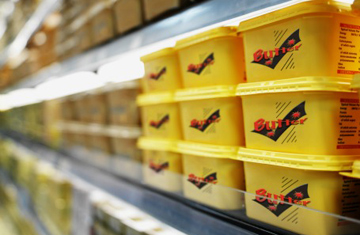
Are the Danish facing an era of dry toast? On Oct. 1, consumers in Denmark saw a sudden jump in the cost of many of their favorite bread-friendly products. The average price of a half-pound package of butter increased by 2.5 krone (or 45 U.S. cents). A pound of cheese rose from 34.5 krone ($6) to 36 krone ($6.50). And don't even think about lard. In a single day, the cost of a half-pound block of pork fat skyrocketed from 12 krone ($2.15) to 16 krone ($2.85) — a 35% increase. Thanks to a new fat tax, Danes are paying more for just about anything they might want to slather on a piece of bread.
Other countries have imposed tariffs on food and drink considered unhealthy, but Denmark is taking the "fat tax" appellation literally. In the name of reducing cardiovascular disease, obesity, and diabetes, the law that went into effect on Saturday specifically targets saturated fats — the fats found most commonly in animal products like butter, cream, and meat. But few outside the government seem to think it's a good idea — or even a healthy one.
The tax, the first of its kind in the world, imposes a price hike based on formula of 16 krone per kilo of saturated fat on any food that contains more than 2.3% (which is how the tax on a 250-gram package of butter, which is 63% saturated fat, comes out to 2.5 krone). Given current Danish consumption — they eat a lot of butter and sausage in Denmark — that should amount to somewhere around 82 million kilos (180 million lbs) of fat subject to the tax.
"At the political level there was a high degree of consensus for this law," says Tor Christensen, chief consultant for Denmark's Ministry of Taxation. "There was wide agreement about trying to improve the average Danish lifespan, about trying to improve the health of the Danish people." The tax was approved by nearly 90% of the Danish parliament.
It's not the first time that the Danish government has taken to regulating less-than-healthy foodstuffs. Sugar has long been subject to higher tariffs, though in its original incarnation, the tax was intended to raise revenue rather than improve public health. In 2004, Denmark became the first country in the world to ban transfats — the solid fats commonly used in snack foods and industrially produced baked goods. Experts say that ban has played a significant role in reducing rates of cardiovascular disease by over 30% in Denmark in the past several years.
People within the food industry aren't happy about the tax, however. "It's very frustrating how this has been implemented," says Poul Pedersen, managing director of Thise Mejeri, an organic dairy cooperative based in northern Denmark. Its 83 farmers produce 2,500 tons of butter per year — and all of them are facing diminished revenues now that they've had to raise prices. "We don't know by how much yet because it's very complicated to figure out, but of course we expect sales to go down," Pedersen says.
The tax applies to all saturated fats equally, regardless of whether they are contained in a McDonald's hamburger or a quart of milk from grassfed cows. That provision has particularly incensed the country's dairy farmers, who bristle at a categorization of their products as unhealthy, and whose recommendations, says Pedersen, were ignored by the government. "Of course we want people to eat heathfully," he says. "And no one should be eating a kilo of butter per day. But we in the dairy industry know that we produce a good and healthy product when it's eaten in moderation."
Restaurants too will feel the pain of the increasing costs. Christian Puglisi, chef of Copenhagen's highly-regarded Relae, hasn't yet raised menu prices, but knows he'll have to once he has tallied his purveyors' new invoices. The bureaucracy worries him less, though, than the tax's impact on the organic farms with which he does most of his business. "Organic is already more expensive than industrially produced [food], and the tax will just make it more so," Puglisi says. "But organic producers can't absorb the price increase the way that industrial can, so fewer people are going to be willing to buy it."
